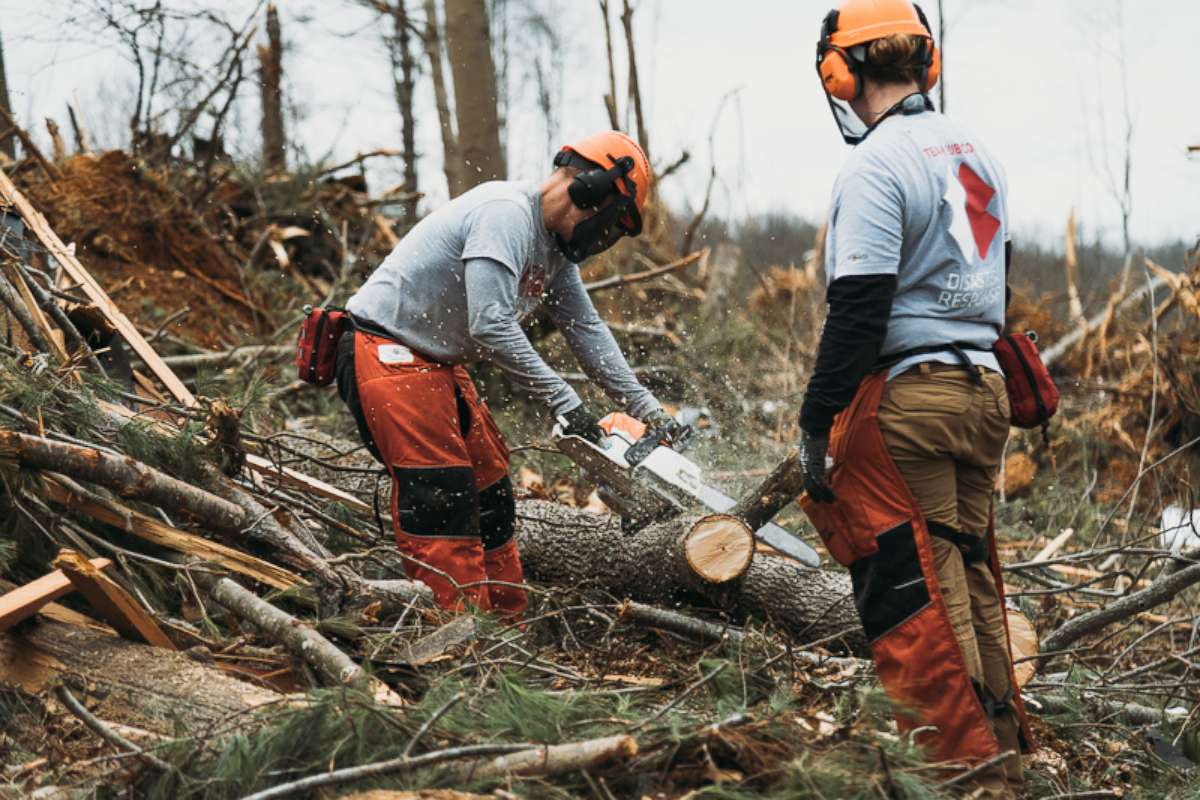Disaster relief groups forced to adapt during coronavirus pandemic
The Red Cross hasn't opened a shelter since January, turning to hotels instead.
It's the beginning of tornado and flood season in the United States, and as disaster relief organizations are deployed, they're adapting and following new protocols to protect staff, volunteers and the victims of these natural disasters from the additional threat of COVID-19.
Before destructive storms ripped across a wide swath of the South earlier this week, the American Red Cross was getting ready, preparing to provide shelter and prepping its staff and volunteers on the latest protocols. In all, more than 100 tornadoes from Texas to Maryland were tracked over a 48-hour period starting Easter Sunday. At least 34 people died, and hundreds of homes were destroyed or severely damaged.
Instead of placing those left homeless or displaced in shelters, as is often the case in this type of disaster, the Red Cross put more than 550 people into 11 hotels across several states to comply with social distancing guidelines.
"It was a safer environment in this pandemic world we're living in," Trevor Riggen, senior vice president of Disaster Cycle Services for the American Red Cross, told ABC News.
It's not unusual for the Red Cross to use hotels, especially for disasters that affect a small number of people, such as home fires. But it hasn't used them at this scale before. Since January, the organization hasn't opened a single shelter, instead placing some 900 people into hotels, Riggen said.
The veteran-led disaster response organization Team Rubicon is currently assisting in debris removal and home repairs like roof-tarping in areas affected by the recent tornadoes, including in Monroe, Louisiana, and Chattanooga, Tennessee. It also has its trained volunteers, dubbed "Greyshirts," assisting in Putnam and White counties in Tennessee following tornadoes in March.
"The safety of our Greyshirts is and always will be our No. 1 priority," Marc DeNofio, the group's public relations manager, told ABC News.
To that end, DeNofio added, the nonprofit is "taking extra precautions," including spacing all cots 6 feet apart in lodging facilities, providing access to hand sanitizer and ensuring the wearing of face masks. "We are being very observant of social distancing guidelines on all of our operations."

Where feasible, the Red Cross is deploying fewer staffers and volunteers to disaster areas, instead managing logistics and communications virtually. The organization also is responding virtually to more incidents such as home fires, for which it's offering recovery assistance and mental health support.
"We'll connect with you by phone, or by video -- FaceTime or Zoom or other video chat -- and talk with the family about what their needs are and still provide that same level of assistance," Riggen said. "If you don't have a phone, we have volunteers who will drive to the scene of the fire and drop off a smartphone for you to use to have those same conversations."
Relief needs have been amplified due to shelter-in-place measures enacted across the country. More than 20 million people have filed for unemployment insurance in the past four weeks, according to the Treasury Department. That places greater attention on home assistance, as people whose houses were damaged by a tornado may have a harder time signing a new lease or making repairs.
"We're assuming that any type of longer-term housing will be more difficult in this environment," Riggen said. "We want to make sure we're supporting them very closely to make sure we're helping them walk through those recovery steps."
Some disaster relief groups have pivoted to address COVID-19.
The AmeriCorps Disaster Response Teams, which often respond to areas affected by hurricanes, tornadoes, forest fires and floods, have several hundred members involved with COVID-19 relief, Samantha Jo Warfield, a spokesperson for the Corporation for National and Community Service, the federal agency that administers AmeriCorps, told ABC News. That effort includes working with the California National Guard on food bank operations and building medical facilities in Washington.
Team Rubicon also is assisting with COVID-19 testing at medical stations and sites in Santa Clara, California, and in North Carolina, as well as providing support in Chicago, New York and in the Navajo Nation in Kayenta, Arizona.
"Our Greyshirts have given countless volunteer hours in food, medicine and other deliveries to communities in need," DeNofio said.
Tornado season is just getting started, moderate to major flooding is anticipated this spring and soon it will be hurricane and wildfire season.
Eventually, the Red Cross may need to open shelters if hotels aren't available after a disaster. The organization has a plan in place for that, too, including a "fairly intense screening" process, Riggen said, including symptom and temperature checks. The protocols also include a greater distance between cots, regular cleaning of all hard services and additional hand-washing stations. If someone doesn't pass an initial screening test, they'll be moved to an isolation area.
"We've really adjusted just about every process we have in place," said Riggen, adding that the Red Cross has learned best practices from partners at the center of coronavirus outbreaks in Italy and China.
Down the road, when wearing face masks and social distancing measures have waned, Riggen said several new adaptations could become permanent fixtures, such as using virtual assistance to reach victims more quickly and send out fewer staffers.
"We're trying to balance that very intently with the real heart of the Red Cross," Riggen said, "which is that face-to-face human contact -- that ability to show somebody that even in really dark moments, like a natural disaster, there are people who care enough to show up in their community, at their house, and help them."




